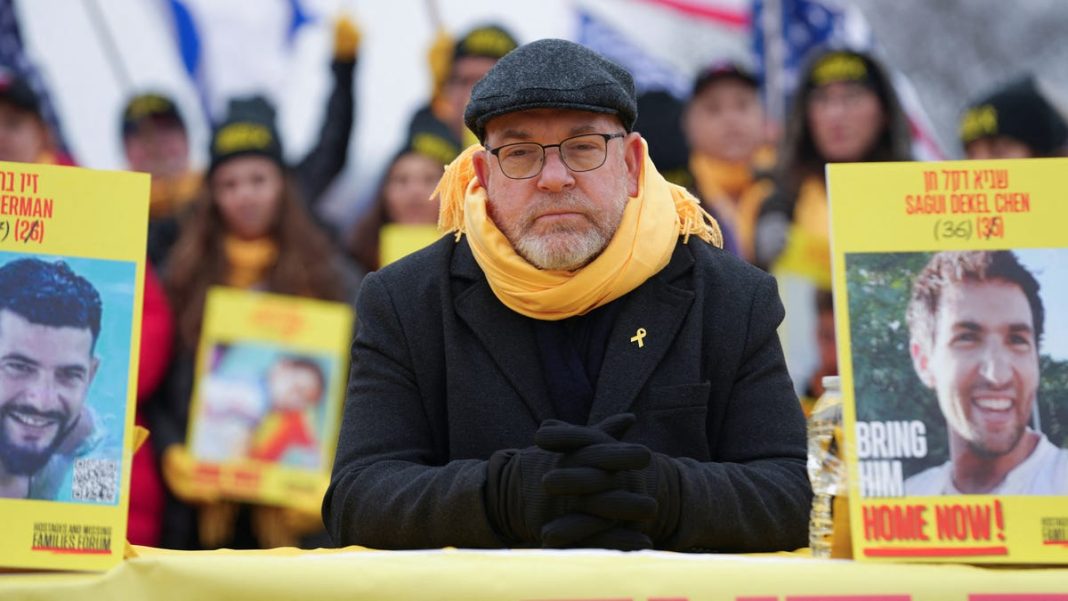Hamas Releases American Hostage in Gaza as a Part of Ceasefire Agreement
On Saturday, Keith Siegel became the first American hostage to be released under a ceasefire agreement between Israel and Hamas, facilitated by U.S. efforts aimed at ending the conflict in the Gaza Strip.
Following his release, there remain six Americans in captivity in Gaza, with four believed to have died. Siegel, aged 65, was freed after spending 15 months in the custody of Hamas. He was taken hostage during the attack by Hamas on Israel on October 7, 2023. Siegel holds dual citizenship in Israel and the United States.
Alongside Siegel, Yarden Bibas, 35, and Ofer Kalderon, 54, were also released.
The first phase of the ceasefire, which began in mid-January and is expected to last until early March, involves the release of 33 hostages, both alive and deceased, in exchange for nearly 2,000 Palestinians currently held in Israeli prisons. This initial phase gives priority to the release of sick, elderly, and female hostages.
Israeli officials have expressed concerns that American hostages Itay Chen, Gad Haggai, Judith Weinstein, and Omer Neutra are dead, and their remains will likely not be returned to their families in the early stages of the agreement.
Siegel hails from Chapel Hill, North Carolina, and was kidnapped alongside his wife, Aviva, from Kibbutz Kfar Aza, which suffered extensive damage during the Hamas attacks. Located just a mile from Gaza, Kfar Aza faced houses that were burnt, shot at, and devastated by tank fire. On October 7, Hamas militants took Siegel from his home, during which he sustained broken ribs and a gunshot wound to his hand.
Aviva Siegel was released during a truce in November 2023. According to her interviews, while held captive, she had to plead for basic necessities like food and water. Since her release, Aviva has been advocating for the Israeli government to assist in securing her husband’s freedom.
Efforts by the Trump Administration to Maintain the Ceasefire
The hostages’ release was part of an agreement finalized during the closing days of former President Joe Biden’s administration, paralleling a framework reported by Biden in May. Previous efforts to finalize a similar deal had failed.
Both Biden and Trump have publicly acknowledged their efforts in bringing about the ceasefire, which has three phases and aims to result in the complete release of all hostages.
Since the ceasefire began, many Palestinians have started returning to northern Gaza, with negotiators hopeful that this might lead to a lasting end to hostilities.
The release of the first American hostage preceded an upcoming visit by Israeli Prime Minister Benjamin Netanyahu to Washington. Netanyahu is set to be the first foreign leader to meet with Trump at the White House since he returned to office. Trump’s special envoy to the region, Steve Witkoff, also visited Gaza and Israel in preparation for this meeting.
‘I Just Want to Hold Him’
Of the 33 hostages scheduled for release during the first stage of the truce, eight are feared dead. Mediators from the U.S., Qatar, and Egypt are expected to resume negotiations for the second phase of the agreement in early February, which could lead to a permanent ceasefire between Israel and Hamas, as well as the release of the remaining hostages.
The Alexander family from New Jersey is anxiously awaiting the release of their 21-year-old son, Edan, from Hamas captivity.
“I just want to hug him, and I hope he will say, ‘You know what? It wasn’t so bad guys. I’m good,'” his father, Adi, shared during a phone conversation. Edan was serving in the Israeli military when he was taken hostage.
Hamas released a video featuring Edan in late November, where he appeared to be speaking under pressure, including messages in English urging the Israeli government to end the war and pursue a peace agreement. The Alexanders understand that due to Edan’s military status when he was abducted, his release may not occur until the second phase of negotiations. Discussions regarding this phase are anticipated to take place in early February. Nevertheless, the Alexanders remain hopeful about the ceasefire and what it may signify for their family.
“We’ve remained hopeful throughout this ordeal. For the first time, it feels like we’re finally making progress,” said Adi Alexander.

